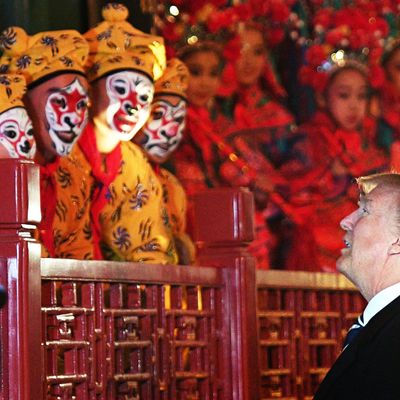
Late last week, American and Chinese officials met for bilateral trade talks in Washington. The White House entered negotiations demanding that Beijing reduce its trade surplus with the U.S. by $200 billion or more, and cease its “theft” of American intellectual property; Xi Jinping’s government entered seeking the suspension of punitive tariffs that President Trump announced on a variety Chinese goods earlier this year, and relief from U.S. sanctions for the Chinese telecom ZTE.
At the end of those talks, Beijing publicly announced that China would increase its imports of American agriculture and energy — something that it had already been planning to do, to meet its burgeoning middle class’s growing demand for meat and fuel. Xi Jinping’s government did not, however, commit to reducing its trade surplus with the U.S. by any set figure, or to take any specific action to address America’s complaints about its intellectual property practices. President Trump, by contrast, suspended the tariffs that he had threatened on $150 billion worth of Chinese imports, and publicly committed to lifting trade restrictions on a Chinese telecom company that had done business with Iran and North Korea in defiance of U.S. sanctions — a move that could, potentially, cost American victims of terrorism $150 million.
By themselves, these developments might not sound alarm bells about the administration’s trade strategy. All things being equal, suspending tariffs that could trigger a trade war while seeking to address imbalances through direct talks makes good sense. And letting ZTE off the hook for doing business with countries is not, on its face, an outrageous concession for the U.S. to make in trade talks with China, so long as doing so secures Washington favorable terms on other points of contention.
But it is difficult to give the Trump administration the benefit of the doubt in its negotiations with China for (at least) three reasons:
• President Trump knows virtually nothing about geopolitics or world trade, and is infamously unwilling to pay attention during briefings on either subject, let alone to study up on the issues themselves.
• The president routinely displays an interest in using public policy as a tool to reward people and entities that help him personally, and to punish those who defy his personal wishes. Which is to say: There is abundant evidence that Trump often makes policy with an eye toward advancing his own interest, rather than the public’s.
• About 72 hours before Trump’s bizarre public promise to help ZTE, the Chinese government agreed to invest $500 million into an Indonesian theme park that will host multiple Trump Organization properties.
On Monday morning, Trump sought to dispel the public’s concerns about the (ostensibly) lackluster results of last week’s trade talks. In a series of morning tweets, the president reassured the public that it could trust him to reach a good trade deal with China — by telling a blatant falsehood about America’s trade relationship with China.
Trump promises he will deliver “fair trade” with China, and thereby, bring down its tariffs and trade barriers for “the first time.” But the credibility of that first claim is undermined by the impossibility of the second: Chinese tariffs on U.S. goods have “come down,” many, many times in the past.
All of which is to say: Nothing Trump tweeted this morning, or had his administration agree to last week, did anything to contradict the suspicion that — to the extent the president knows what he’s doing in negotiations with the Chinese — what he is doing is using the power of his office to advance his personal financial interests.






























